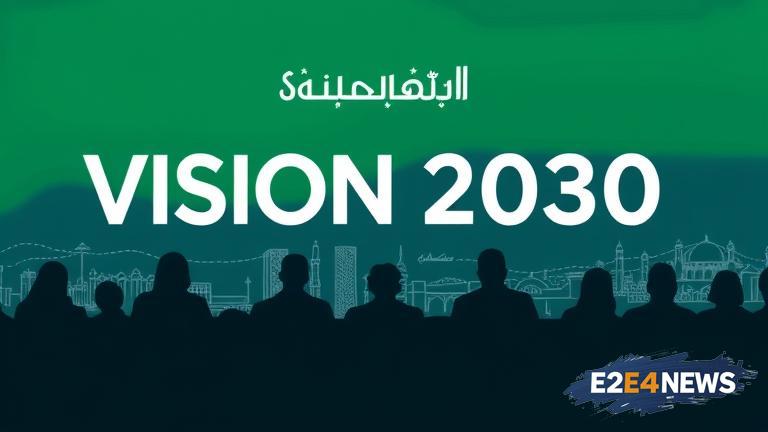Saudi Arabia has launched its ambitious Vision 2030 plan, a comprehensive strategy to diversify its economy and reduce its dependence on oil exports. The plan, which was unveiled by Crown Prince Mohammed bin Salman, aims to develop a thriving economy that is driven by innovation, entrepreneurship, and foreign investment. One of the key goals of Vision 2030 is to increase the share of foreign investment in the kingdom’s GDP from 3.8% to 5.7% by 2030. To achieve this, the government plans to establish a number of special economic zones, including the NEOM mega-city, which will be powered by 100% renewable energy. The plan also aims to increase the private sector’s contribution to the economy from 40% to 65% by 2030, and to reduce the unemployment rate among Saudi nationals from 11.6% to 7%. In addition, Vision 2030 aims to develop a thriving tourism industry, with a focus on cultural and entertainment events. The government plans to increase the number of tourists visiting the kingdom from 3 million to 100 million by 2030, and to develop a number of new tourist destinations, including the Red Sea Project. The plan also includes a number of initiatives to support small and medium-sized enterprises (SMEs), including the establishment of a number of business incubators and accelerators. Furthermore, Vision 2030 aims to develop a number of strategic sectors, including manufacturing, logistics, and renewable energy. The government plans to increase the share of manufacturing in the kingdom’s GDP from 10% to 20% by 2030, and to develop a number of new industrial cities, including the Jeddah Industrial City. The plan also includes a number of initiatives to support the development of the kingdom’s human capital, including the establishment of a number of new universities and research centers. In addition, Vision 2030 aims to improve the business environment in the kingdom, with a focus on reducing bureaucracy and increasing transparency. The government plans to establish a number of one-stop shops to provide services to investors and businesses, and to develop a number of online platforms to facilitate the process of starting and running a business. Overall, Vision 2030 is a comprehensive plan that aims to transform the Saudi economy and reduce its dependence on oil exports. The plan has a number of ambitious goals, including increasing the share of foreign investment in the kingdom’s GDP, developing a thriving tourism industry, and supporting the growth of SMEs. If successful, Vision 2030 could have a significant impact on the Saudi economy and help to drive growth and development in the kingdom. The plan is also expected to have a positive impact on the environment, with a focus on reducing carbon emissions and increasing the use of renewable energy. In conclusion, Vision 2030 is an ambitious plan that has the potential to transform the Saudi economy and drive growth and development in the kingdom. With its focus on innovation, entrepreneurship, and foreign investment, the plan is expected to have a significant impact on the kingdom’s economy and help to reduce its dependence on oil exports. The plan is also expected to have a positive impact on the environment, with a focus on reducing carbon emissions and increasing the use of renewable energy. The government’s commitment to implementing the plan is evident, with a number of initiatives already underway to support the development of the kingdom’s economy. As the kingdom continues to implement Vision 2030, it is expected that the plan will have a significant impact on the Saudi economy and help to drive growth and development in the kingdom. The plan is a key part of the kingdom’s strategy to diversify its economy and reduce its dependence on oil exports, and it is expected to have a positive impact on the kingdom’s economy and environment. With its focus on innovation, entrepreneurship, and foreign investment, Vision 2030 is an ambitious plan that has the potential to transform the Saudi economy and drive growth and development in the kingdom.
